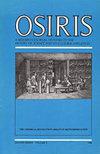“安全驾驶取决于驾驶人”:心理学家与汽车安全主题,1920-55
IF 1
3区 哲学
Q2 HISTORY & PHILOSOPHY OF SCIENCE
引用次数: 4
摘要
在20世纪的头几十年里,车祸造成的死亡人数迅速上升,像赫伯特·胡佛(Herbert Hoover)这样的有影响力的人物寻求控制这个工业资本主义的象征及其用户的方法。这些早期的监管努力开辟了汽车安全的新领域,这是一个拥挤的市场,充满了潜在解决方案的买家和卖家的想法。这篇文章考察了20世纪20年代和30年代,作为一个专业,心理学,进入并试图影响这个新兴领域,这彻底纠缠科学和资本主义。它描述了心理学家如何利用国家研究委员会的一个委员会来寻找权力职位。它认为,心理学家的成功和失败在很大程度上是由心理学家的技能、其他强大的职业(如工程)以及可用的赞助和资金之间的辩证过程决定的。心理学家最大的成功来自于假设了一个新颖的实体——易出事故的司机。然而,到了20世纪30年代末,最有影响力的心理学家开始反对这一观点,批评那些在工业界和政府中推广这一观点的不那么有声望的同事。知名心理学家最担心的是,自私自利的年轻同事过度推销自己的想法,与企业资本主义走得太近,从而削弱了这个年轻职业本已脆弱的可信度。本文章由计算机程序翻译,如有差异,请以英文原文为准。
“Safe Driving Depends on the Man at the Wheel”: Psychologists and the Subject of Auto Safety, 1920–55
In the first decades of the twentieth century, deaths from automobile accidents quickly mounted, and influential figures, like Herbert Hoover, sought ways to control this icon of industrial capitalism and its users. These early regulatory efforts opened up the new field of automotive safety, a crowded market for ideas full of both buyers and sellers of potential solutions. This essay examines the 1920s and 1930s, as one profession, psychology, entered and sought to influence this emerging field, which thoroughly entangled science and capitalism. It describes how psychologists used a committee in the National Research Council to find positions of power. It argues that the psychologists’ successes and failures were largely determined through a dialectical process between the psychologist’s skills, other powerful professions, like engineering, and available patronage and funding. The psychologists’ greatest success came through positing a novel entity—the accident-prone driver. Yet by the late 1930s, the most influential psychologists had turned against this idea, criticizing less prestigious colleagues who promoted it to industry and government. Established psychologists worried mostly that self-interested, junior colleagues were overselling their ideas and aligning too closely with corporate capitalism, thereby undermining the young profession’s already tenuous credibility.
求助全文
通过发布文献求助,成功后即可免费获取论文全文。
去求助
来源期刊

Osiris
管理科学-科学史与科学哲学
CiteScore
1.10
自引率
0.00%
发文量
18
审稿时长
>12 weeks
期刊介绍:
Founded in 1936 by George Sarton, and relaunched by the History of Science Society in 1985, Osiris is an annual thematic journal that highlights research on significant themes in the history of science. Recent volumes have included Scientific Masculinities, History of Science and the Emotions, and Data Histories.
 求助内容:
求助内容: 应助结果提醒方式:
应助结果提醒方式:


